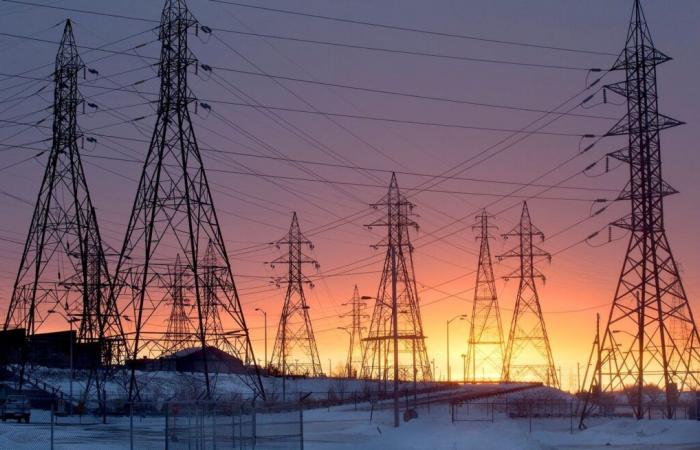Already 25 years since the year 2000. Duty takes us back to a quarter of a century marked by significant events and new trends that still shape our society. Today: electricity prices, which will be expected to increase, possibly sign the end of an exceptional model for Quebec. But not all the experts we spoke with agree on how to achieve this.
If it wants to achieve its objectives of decarbonizing its economy for 2050, Quebec will have to produce more electricity, and therefore acquire greater production, transport and distribution capacity for this newly produced electricity. It’s mathematical.
In his Plan d’action 2035Hydro-Québec is therefore planning the construction of new infrastructure to meet these additional power needs of between 8,000 and 9,000 megawatts (MW). The state-owned company will also have to add nearly 5,000 kilometers of lines to transport this additional capacity.
In total, investments aimed at meeting growth in demand will total between 90 and 110 billion dollars by 2035. The state company will therefore have to find 9 to 11 billion per year over the next 10 years. In addition to the 4 to 5 billion which will also be needed annually to ensure the reliability and quality of existing assets. And this, in a context where it will cost more to operate and maintain an electricity network exposed to ever more extreme climatic events.
To finance these investments, Hydro-Québec will have to increase its revenues and therefore the average unit price of its electricity, says Johanne Whitmore, principal researcher at the Chair of Energy Sector Management at HEC Montréal.
“Electricity cannot remain at the same price as in 1960 or in the 1990s. The increase in prices is not linked only to the energy transition. It must also evolve with the costs of labor, transportation, materials, etc. Hydro-Québec is also not immune to the increase in the cost of living. You have to think a little bigger,” she explains.
Moreover, the researcher affirms that it is not because we pay more that we will become poorer and cites the case of European countries which pay more for their electricity, but which have economies whose domestic products crude oils are growing.
Towards a review of cross-subsidization?
If the experts with whom we spoke Duty agree on the fact that electricity prices will be expected to increase over the coming years and decades, their opinions differ as to the modalities of this increase and the identity of those who will have to take control to the portfolio, particularly if the cross-financing mechanism is modified.
In force since 1962, cross-subsidization consists of charging industrial customers rates higher than costs in order to finance rates lower than costs for residential customers. It is this mechanism that today allows all Quebecers to pay relatively affordable electricity rates.
The holder of the Chair in Energy Sector Management at HEC Montréal, Pierre-Olivier Pineau, is one of those who would like this pricing system to be reviewed, because according to him it would “unduly” benefit residential customers, to the detriment of customers. commercial and industrial.
Above all, he argues, low prices would make energy efficiency “difficult to sell” and would not encourage Quebecers to reduce their electricity consumption, while Quebec is one of the places on Earth where we consumes the most electricity per pipe head.
“It is not because the price of electricity increases that the energy bill necessarily increases. With higher prices, we can take actions to reduce our consumption, such as better insulating our home, actively managing our consumption, installing heat pumps, solar panels, etc. », explains Mr. Pineau.
The latter also regrets that the Quebec government has capped increases in residential rates at 3%, thus placing the increase in rates more on businesses. Furthermore, this limit would do little to protect the least well-off individuals, who occupy housing with the lowest energy efficiency.
“It’s scandalous from an economic point of view. It’s scandalous from a social point of view because the people who consume the most are the richest and they are the ones who benefit the most from artificially low prices, explains Mr. Pineau. Paying more could, however, actually be a blessing for Quebec’s economy — if obviously it is implemented well and consumers are exposed to a cost closer to real costs. »
Making manufacturers pay
For his part, energy sector regulatory analyst Jean-François Blain believes, however, that it is up to manufacturers to participate more widely in the collective effort.
“Why should we reconsider today, in 2025, the practice of socializing the additional cost – and therefore selling at the average cost of electricity – regardless of customers and their seniority? » he asks himself from the outset.
In a criticism addressed to Prime Minister François Legault and his former Minister of the Economy, Innovation and Energy, Pierre Fitzgibbon, Mr. Blain suggests making foreign investors like Northvolt pay a rate higher than the cost. AVERAGE.
“It is not up to individuals to pay for the discounted offer offered to these companies. Quebec cannot afford this luxury given the economic situation,” says the analyst. The latter also refuses that the price of electricity could one day be deregulated and fixed according to Hydro-Québec’s revenue needs.
“That’s not how an essential strategic resource developed by a community and based on the interest of a community works. »
At the same time, Mr. Blain says he is in favor of average cost pricing for businesses, institutions and households, who still use fossil energy products to satisfy part of their energy needs to enable them to decarbonize their uses.
Support all customers
For Mme Whitmore, if Quebec wants to succeed in decarbonizing its economy by 2050, all customers will have to push the wheel.
“Industries, for example, have more leverage to seek subsidies, to play on the exchange rate, tax credits, the possibilities of negotiating energy blocks or participating in cutting-edge programs. The residential consumer does not have these levers,” she explains to Duty.
Mme Whitmore also emphasizes that owners, for example, will be able to seek financing to improve the energy performance of their building, unlike tenants. She also notes that the commercial sector does not have the capacity of industrialists to seek credits, while it is the customers who have the highest tax burden.
Still, an in-depth overhaul of the electricity pricing system could spell the end of a unique model in Canada, even if British Columbia and Manitoba also have pricing based on the average cost of electricity. ‘electricity.
“That’s the goal of Bill 69, to bring about reform and modernize energy regulations in Quebec,” says Mr.me Whitmore. It has been since the 1990s that there has been any reform to this law. The issues have changed and we have no choice but to revisit all that. »
The researcher also believes that it will be important to ensure that this modernization is not used for political purposes, because “in the long term, it is not in the interest of Quebecers.”
“We need a nuanced, depoliticized approach, which objectively takes into account all the issues to then establish an independent approach for all clienteles,” she advocates.






